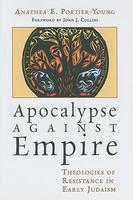
Book Summary
A fresh and daring take on ancient apocalyptic books. The year 167 b.c.e. marked the beginning of a period of intense persecution for the people of Judea, as Seleucid emperor Antiochus IV Epiphanes attempted forcibly and brutally to eradicate traditional Jewish religious practices. In Apocalypse against Empire Anathea Portier-Young reconstructs the historical events and key players in this traumatic episode in Jewish history and provides a sophisticated treatment of resistance in early Judaism. Building on a solid contextual foundation, Portier-Young argues that the first Jewish apocalypses emerged as a literature of resistance to Hellenistic imperial rule. She makes a sturdy case for this argument by examining three extant apocalypses, giving careful attention to the interplay between social theory, history, textual studies, and theological analysis. In particular, Portier-Young contends, the book of Daniel, the Apocalypse of Weeks, and the Book of Dreams were written to supply an oppressed people with a potent antidote to the destructive propaganda of the empire renewing their faith in the God of the covenant and answering state terror with radical visions of hope..
Book Details
| Book Name | Apocalypse Against Empire: Theologies Of Resistance In Early Judaism |
| Author | Anathea Portier-young, John J. Collins |
| Publisher | William B. Eerdmans Publishing Company (Jan 2011) |
| ISBN | 9780802865984 |
| Pages | 462 |
| Language | English |
| Price | 1821 |








